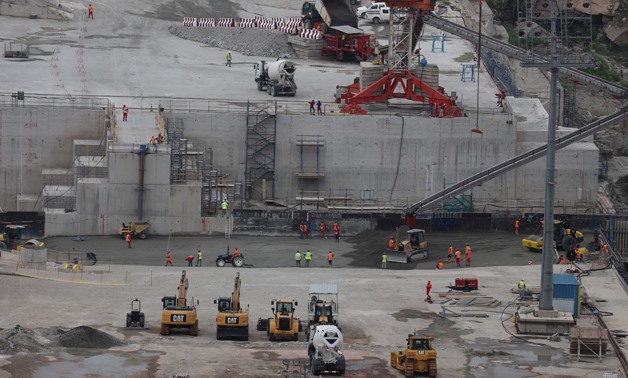
FILE- Workers and machinery are seen at Ethiopia's Grand Renaissance Dam as it undergoes construction on the river Nile in Guba Woreda, Benishangul Gumuz Region, Ethiopia September 26, 2019. Picture taken September 26, 2019. REUTERS/Tiksa Negeri
CAIRO - 1 March 2020: Egypt slammed the Ethiopian government after the latter criticized the final round of U.S., WB-brokered negotiations on the controversial Grand Ethiopian Renaissance Dam (GERD).
In a joint statement by the Egyptian Ministry of Foreign Affairs and the Ministry of Water Resources and Irrigation, the Egyptian government expressed its resentment over
issued on Saturday from the Ethiopian Ministry of Foreign Affairs and Irrigation and Energy of the Federal Democratic Republic of Ethiopia, in which Ethiopia announced that it will fill the GERD’s reservoir despite the U.S. warning of taking action without an agreement with the downstream countries, Egypt and Sudan.
Egypt said it totally rejected Ethiopia’s announcement of filling the Renaissance dam’s reservoir in parallel with the construction of the dam, saying “Ethiopia violates the article No. 5 of the 2015 Declaration of Principles, which stipulates that all three countries shall reach an agreement on the rules of filling and operating the dam before starting the process of filling the reservoir with water.”
Egypt added in its statement that Ethiopia’s absence in the Washington-held meetings aimed at hampering the course of negotiations, adding that the Ethiopian latest remarks "included fallacies, distorted the facts, and showed Ethiopia’s clear repudiation of its commitments to the 2015 Declaration of Principles.”
“What has been reached in the recent round of Washington meetings came due to Ethiopia's deliberate absence and is fully consistent with the international law, said Egypt, adding that what has been reached in the meetings represents a fair and balanced compromise drawn from intensive negotiations rounds between Egypt, Sudan and Ethiopia over the past four months in Washington.
The deal reached in Washington represents a solution to the outstanding issues if Ethiopia has a good intention of not causing harm to the Egyptian interests, Egypt continued, saying that violations of the international laws and the Declaration of Principles are impermissible under Ethiopia’s ownership of the dam.
On Friday evening, Egypt’s Ministry of Foreign Affairs announced that it has unilaterally initialed the deal, saying “In light of the fact that this agreement preserves Egypt’s water interests and ensures that it is not subjected to significant harm, Egypt has initialed this agreement as an affirmation of its serious will to achieve its objects and purposes.”
Only Egypt and Sudan participated in the final round of US,WB-brokered meetings in Washington after Ethiopia abstained from the participation.
U.S. Treasury Secretary Steven T. Mnuchin praised Egypt’s move of initialing deal of the rules for filling and operating the dam, cautioning Ethiopia against testing and filling the dam without reaching an agreement.
“We appreciate the readiness of the government of Egypt to sign the agreement and its initialing of the agreement to evidence its commitment,” said Mnuchin in a statement, adding “consistent with the principles set out in the DOP, and in particular the principles of not causing significant harm to downstream countries, final testing and filling should not take place without an agreement.
The difference between the three Nile basin countries dates back to May 2011 when Ethiopia started building the dam; Egypt voiced concern over its water share [55.5 billion cubic meters]. Three years later, a series of tripartite talks between the two countries along with Sudan began to reach an agreement while Ethiopia continued the dam construction.
In 2015, the three countries signed the Declaration of Principles, per which the downstream countries [Egypt and Sudan] should not be negatively affected by the construction of the dam. Since then, the talks have been resumed, but In October 2019 blamed Addis Ababa for hindering a final agreement concerning a technical problem, calling for activating the Article No. 10 of the Declaration of Principles, which stipulates that if the three countries could not find a solution to these differences, they have to ask for mediation.

Comments
Leave a Comment